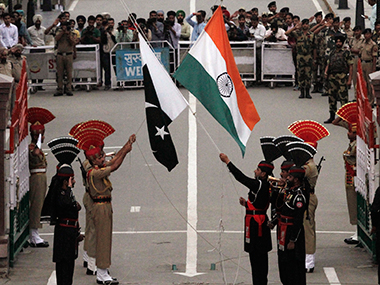First, the big news. The next round of India-Pakistan talks at the level of Chiefs of Border Security Force (BSF) and Pakistan Rangers in New Delhi beginning from 9 September is on track. This in itself is a big move forward considering that the NSA-level talks between the two sides have just been scuppered amid cacophony. The primary agenda of these talks would be issues like cross-border firing or infiltration or the like. Pakistan has already upped its ante by pushing a 13-point agenda and it remains to be seen how the Indians respond to the Pakistani wish list. [caption id=“attachment_2419142” align=“alignleft” width=“380”]  Representational image. Image courtesy: Reuters[/caption] However, the success or failure of these talks would depend on how much the two sides are willing to give and take. The fact remains that the two sides engaging in bilateral talks close on the heels of flop show of the NSA talks. The ground situation does not paint a rosy picture. Both sides are to be blamed equally for this. The two sides have been guilty of tackling the NSA talks in a ham-handed manner. Both took the kind of diplomatic positions which are normally taken in war-time situations, not like the normal diplomatic template they should have resorted to. The genesis of the problem lay in the Ufa statement which was read out jointly by the two foreign secretaries. The main problem in the Ufa statement was that each side practiced the flawed approach of winner-takes-it-all. This kind of situation works well only in war situations, not in diplomacy. Diplomacy is all about give and take. The main problem in the Ufa flop show was that the two sides tried to go back home with concrete deliverables without caring for the other side. Indians exulted claiming that they stood tall at Ufa and did not allow Pakistan to raise the K word. This practically hemmed in the Pakistani side, which went back home with guilt, rather than the feeling of some achievement. The end result was that the Indian victory proved to be hollow. The moment the Pakistani interlocutors in Ufa returned home, they realised that the Ufa statement was well past its sell-by date and that there was nothing in the Ufa spirit that they needed to care about, leave alone think about implementation. Thus, the Ufa agreement did not work from the Pakistani viewpoint. This is not the way diplomacy should be practiced. Both sides have to take care of each other’s political considerations and compulsions for any understanding to be finalized. This was the primary reason for the fiasco that eventually exploded in the face of India and Pakistan as they sought to engage with each other at the NSA level. Ideally, India should have agreed to the text of “both sides agreeing to resolve all outstanding bilateral issues, including Jammu and Kashmir”. The heavens would not have fallen because of this plain speak, as Jammu and Kashmir is without doubt an outstanding bilateral dispute. This has been one of the major sticking points between the two nuclear armed neighbours for decades and India wouldn’t have been making a compromise if it were to mention it upfront in a bilateral statement with Pakistan. But this was not to happen. The Modi government got a chance to indulge in chest thumping by telling Indians back at home that it did not allow Pakistan to raise the K word without realising that the Ufa statement wouldn’t survive even for a minute in Pakistan once the Pakistani interlocutors reach home. This is precisely what happened and the Ufa spirit was killed. This is the hard lesson that both India and Pakistan need to learn from Ufa and re-calibrate their future bilateral engagements if they want this process to pay dividends. Thus far, the India-Pakistan engagements have been high on sound and fury, but abysmally low on the delivery quotient. The upcoming talks between the heads of BSF and Pakistan Rangers provide yet another opportunity to try genuine diplomacy and give a new life to bilateral ties. It remains to be seen whether this can be done. If the Past history is an indication, this is not possible unless the two sides change their approach. *The writer is Firstpost Consulting Editor and a strategic analyst who tweets @kishkindha
The success or failure of the talks between the Border Security Force (BSF) and the Pakistani Rangers would depend on how much the two sides are willing to give and take.
Advertisement
End of Article
Written by Rajeev Sharma
Consulting Editor, First Post. Strategic analyst. Political commentator. Twitter handle @Kishkindha. see more


)

)
)
)
)
)
)
)
)



